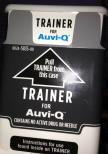



January 2013 Bulletin
Guest Speaker:
Dr. Ralph Strauss
Strauss Allergy & Asthma Therapy
Westbury and Commack, New York
Notes by: K. Grigiletto
At the January 16 meeting, PAK welcomed Dr. Ralph Strauss, a local allergist, who spoke to us about assigning risk, introduced the new epinephrine auto-injector, and answered questions from members.
Dr. Strauss began his talk by noting that allergies have been around for a long time but Food Allergy is very new. He told us that currently, 3-6% of the pediatric population has food allergies.
Assigning Risk
• Allergists will often study cases collectively, so at our PAK meeting Dr. Strauss gave us a chance to ‘play doctor’ by offering us a hypothetical case of a child whose blood tests pointed to milk, egg, and peanut allergies. Dr. Strauss encouraged an interactive talk as we considered the best treatment. “How do you assign risk?” he asked. “We have an evolving state of information that’s changing and doctors bring their own bias.” We enjoyed a lively conversation with Dr. Strauss who said lab tests are not enough; they need to be correlated with what we actually witness in the patient.
Allergists will often study cases collectively, so at our PAK meeting Dr. Strauss gave us a chance to ‘play doctor’ by offering us a hypothetical case of a child whose blood tests pointed to milk, egg, and peanut allergies. Dr. Strauss encouraged an interactive talk as we considered the best treatment. “How do you assign risk?” he asked. “We have an evolving state of information that’s changing and doctors bring their own bias.” We enjoyed a lively conversation with Dr. Strauss who said lab tests are not enough; they need to be correlated with what we actually witness in the patient.
For a child who is allergic to milk and egg, Dr. Strauss would give him or her products made with milk or egg baked in as an ingredient in foods if tolerated. He said if you go with “strict avoidance,” if an accidental ingestion were to occur, it may be more likely to be anaphylactic. For milk, 80% will outgrow the allergy by age five. He would try to give a little egg or milk baked into a product, as much as the child could tolerate. Milk and egg are pretty predictable. For example, if the child had a lot of milk, and only reacted with hives, the child may not even need to carry an Epi-Pen.
With Food Allergy, the higher the numbers the more likely a child is to have a reaction but Dr. Strauss also noted that a patient might have a number off the chart and not react. The ‘number’ is just an indicator of probability. He told us the real test is the challenge: “you can tolerate it -- or you can’t.” He also said that a child can inherit a tendency to have allergic reactions, but does not inherit specific food allergies.
Peanut and tree nuts are potentially the most dangerous food allergies. If the child has a high score for peanut without any history of a reaction, he or she has a significant probability of having a true allergy. So, in the case of Peanut, Dr. Strauss would prescribe an Epi-Pen. He would also put that child on a peanut-free diet and avoid any exposure.
Next, Dr. Strauss told us about encouraging results with Peanut De-sensitization studies underway at the Jaffe Food Allergy Institute at Mt. Sinai, Duke University, and other locations that conduct research in food allergy. Most participants in the studies are increasing their tolerance for peanut. However, many questions still remain. For example, if the child stops the de-sensitization practice, will the peanut allergy spring back in a couple of years?
New Epinephrine Auto Injector
The new device is Auvi-Q. Dr. Strauss told us it’s a single dose and fits in your pocket. Besides the square shape, what’s different is that it has a voice-activated mechanism that speaks the directions on usage. It became available at the end of January.
Next month, PAK celebrates its 7th year in service supporting our local food-allergy community.
Disclaimer:
PAK is not a professional or medical organization. It is a group of parents sharing information and supporting each other. The discussions, meeting minutes, handouts, guest speakers, agendas, and other products of our support group do not constitute medical/legal advice and should not be relied upon as such. Always discuss individual health questions and medical issues with a qualified personal physician. In regard to Guest Speakers, the purpose of the presentations is to provide a variety of opinions on the spectrum on allergy issues. By no means is PAK adopting the views of its speakers, or endorsing them as medically accepted in the community. It is up to the guests to weigh the persuasiveness and acceptability of the presentations, based on their own knowledge and research.
Does your child have severe food allergies?
You've come to the right place.

